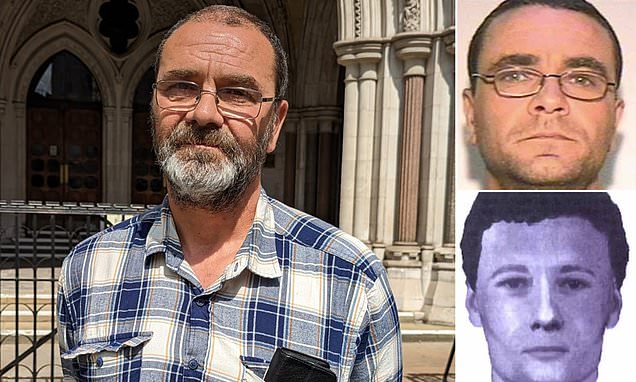Man who served 17 years in jail for rape hopes to clear his name today
Man, 57, who served 17 years in jail for a rape he says he did not commit hopes new Court of Appeal hearing today will finally clear his name after DNA breakthrough pointed at another male suspect
- Andrew Malkinson was jailed in 2004 after being found guilty of a 33-year-old
A man who maintained his innocence as he spent 17 years in jail for rape will today hear whether the Court of Appeal will quash his conviction after new DNA evidence emerged pointing to another potential suspect.
Andrew Malkinson, 57, was jailed in 2004 after being found guilty of raping a 33-year-old mother-of-two next to the M61 in Little Hulton, near Manchester, a year earlier.
He was jailed for life with a minimum term of seven years but remained in prison for a further 10 because he maintained he was innocent, claiming more recently ‘no one should have to suffer what I’ve been through’.
At the time of his trial, there had been no DNA linking the former security guard to the case.
And the jury, who convicted Malkinson on a majority verdict, were asked asked to make their decision solely on identification evidence.
Andrew Malkinson, 57, (pictured outside the Royal Courts of Justice earlier this year) was jailed in 2004 after being found guilty of raping a 33-year-old mother-of-two next to the M61 in Little Hulton, near Manchester. His case will be heard at the Court of Appeal today
E-fit of the suspect in the rape case (left) and a mugshot of Malkinson shortly after he was arrested (right)
In January this year, Malkinson’s case was referred to the Court of Appeal by the Criminal Cases Review Commission (CCRC), which investigates potential miscarriages of justice, after the new evidence was discovered.
Greater Manchester Police (GMP) and the Crown Prosecution Service (CPS) confirmed in May that they will not contest Mr Malkinson’s appeal, and the court may quash his conviction at today’s hearing if it decides it is unsafe.
Speaking following the police’s statement, Mr Malkinson said: ‘I’ve suffered incalculably for the last 20 years as a result of my wrongful conviction, and I continue to suffer each day.
‘I have always known I am innocent. Finally, the prosecution has acknowledged my conviction should not stand.
‘Of course, it is still the Court of Appeal’s decision to grant me justice. I sincerely hope they will give serious consideration to the disclosure failures which denied me a fair trial.
‘The police must be made accountable – no one should have to suffer what I’ve been through.’
The court still has to determine the outcome and scope of the appeal, despite the lack of resistance. His case will be heard from 10.30am this morning by Lord Justice Holroyde and two other judges.
While his main ground of appeal is the fresh DNA evidence, his lawyers told the court at a preliminary hearing in May that there were photographs of the victim’s hands, corroborating her evidence that she scratched her attacker and broke a nail, which were not disclosed at the time of Mr Malkinson’s trial.
They also said there is evidence that one of the key identification witnesses was a ‘long-term user of heroin’, which may have affected his memory, but that was not known by Mr Malkinson or his legal team at trial.
At the preliminary hearing in May, Edward Henry KC, for Mr Malkinson, told the court the CCRC had been aware since 2009 that there was ‘crime specific’ DNA which was not a match for either Mr Malkinson or the victim.
However, he said at that time the CCRC ‘did not consider it tipped the balance towards a referral’ to the Court of Appeal.
But in October last year, the sample was found to be a partial match for another man, who the court ordered can only be identified as Mr B.
Mr Malkinson previously applied twice for his case to be reviewed by the CCRC, but was turned down, eventually being released from prison in December 2020.
After his release, advancements in scientific techniques allowed his legal team, supported by legal charity Appeal, to provide new DNA analysis that cast doubt on his conviction to the CCRC.
The body then commissioned its own testing which found that DNA from the victim’s clothing matched another man on the national police database.
GMP confirmed in January that a man had been arrested and released under investigation in light of the new information, but no decision has been made as to whether he will be charged.
Source: Read Full Article




